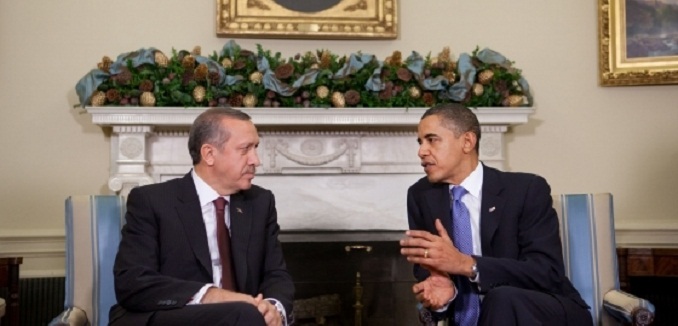Turkish diplomats scrambled for a second day to contain the fallout from a Washington Post bombshell published late Wednesday night, as journalists published more details surrounding allegations that top Turkish officials – including the country’s prime minister Recep Tayyip Erdogan and its intelligence chief Hakan Fidan – deliberately burned 10 Iranians who had been working with Israel’s Mossad to reveal details of Iran’s nuclear program. The Wall Street Journal had already revealed that Fidan passed classified U.S. intelligence to Iran, and the Long War Journal blog yesterday expanded on long-standing concerns over the spy chief’s ties to Iran and to other anti-Western elements.
In June 2010, the Israeli daily Haaretz reported that Israel’s defense establishment, and the Mossad in particular, was concerned about Fidan’s appointment and “the implications of that appointment vis-a-vis Turkish relations with Israel and Iran.” The following month, Israeli Defense Minister Ehud Barak denounced Fidan, calling him a “friend of Iran.” In addition, Barak warned that secrets shared with Turkey “could become open to Iran over the next several months” because of Fidan.
Turkish officials were already trying to dampen an ongoing controversy over Ankara’s plans to purchase and integrate Chinese missile assets – Western defense officials say the plan will introduce a “virus” into NATO’s command and control infrastructure – and the allegations regarding Fidan will deepen suspicions regarding Turkey’s status as a U.S. and NATO ally. They will also have diplomatic impacts. The New York Times noted this morning that the controversy has strained an already faltering U.S.-backed effort to restore ties between Israel and Turkey. Turkey had steadily eroded the country’s relationship with Israel over several years, and formally downgraded ties after a U.N. investigation found Israel justified in intercepting a Turkish vessel that had been trying to break Israel’s blockade of the Hamas-controlled Gaza Strip. Israeli commandos intercepting the ship had been attacked by its passengers, and nine people died in the subsequent fighting. Ankara’s interpretation of the events were at odds with what the U.N. concluded, and Turkish officials lashed out against the findings and against Israel.
A senior Israeli official, who spoke on the condition of anonymity because of the delicate diplomatic situation, said that Israel very much wanted to renew the relationship but that in public statements, Turkish officials had added more and more conditions, like a demand that Israel accept responsibility for the deaths in the raid.
[Photo: Randam / Wiki Commons]




